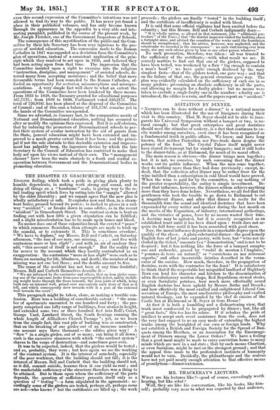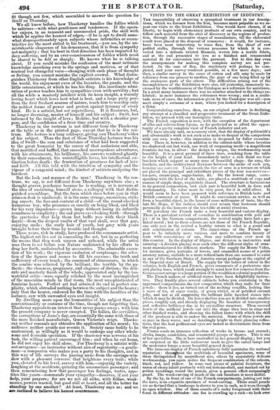MR. THACKERAY'S LECTURES.
WHAT are his lectures like ?—good of course, exceedingly worth hearing, but like what ?
Well, they are like his conversation, like his books, like him- self ; probably very. near to what was expected by that audience, fit though not few, which assembled to answer the question for itself on Thursday.
We all knew before, how Thackeray handles the follies which he satirizes—with what gentleness and tenderness. If the opera- tor enjoys, in an innocent and unconcealed pride, the skill with which he applies the keenest of edges,—if he is apt to dwell some- what disproportionately upon subjects whose infirmities or eccen- tricities are the most suited to his treatment,—you see, by the un- mistakeable eloquence of his demeanour, that it is from sympathy not malignity ; that his bent in that direction has been imparted by deep suffering, and by an over-consciousness of foibles which must be shared to be felt so sharply. He knows what he is talking about. If you could mistake the confession of the most intimate knowledge searching even to the springs and motives, or of that musical but changeful voice—changing with each phase of thought or feeling, you cannot mistake the explicit avowal. What distin- guishes Thackeray from other English satirists is his knowledge of the world, his enjoyment even of the luxuries, the gauds, and the little ostentatious, at which he has his fling. His inordinate admi- ration of power teaches him to sympathize even with servility ; but all the while a masterly intellect with its keen insight, a warmly loving heart which loves best what is best, and a large piety pure from the first freshest sources of nature, teach him to worship only the noblest forms of power and protest against tyranny of every kind. He is a satirist, but not supercilious. It is Rousseau, but, no longer dreaming, master of himself and his subject ; Swift, but informed by the insight of love ; Moliere, but with a steadier pur- pose, and the confidence of a freer time and country.
Thackeray in the rostrum is not different from the Thackeray at the table or in the printed page, except that he is in the ros- trum. His lecture is a long soliloquy, giving you Thackemy's idea of his subject. Thus the first of these Thursday lectures was his idea of Swift—the sum and substance of what had been suggested to the great humorist by the career of that audacious and able, that mortified and baffled, that cassocked unscrupulous adventurer, with his attainments, his brilliancy, his sorrows rendered ghastly by their concealment, his unintelligible loves, his intellectual ex- tinction before death ; the frustration of greatness for lack of love and faith. All this told with the intuition of sympathy and the vigour of a congenial mind; the kindest of satirists analyzing the harshest.
But the look and manner of the man Thackeray in the ros- trum, we say, is not different from Thackeray anywhere else ; a thought graver, perchance because he is reading, or is nervous at the idea of sustaining, himself alone, a colloquy with that distin- guished assemblage. But the form which rises before you in that crimson desk is unaltered; it is the same strange, anomalous, strik- ing aspect; the face and contour of a child—of the round-checked humorous boy, who presumes so saucily on being liked, and liked for his very impudence—grown large without losing its infantile roundness or simplicity ; the sad grave eyes looking forth—through the spectacles that help them but baffle you with their blank dazzle—from the deepest vaults of that vast skull, over that gay, enjoying smile ; the curly hair of youth, but grey with years brought before their time by trouble and thought. Those years, rich in study, have produced the consummate artist. The highest art lies not in concealing the art, but in so perfecting the means that they work unseen and unheard, while the artist uses them to set before you Nature undistorted by his efforts to drag her forth, undistracted by accessories. The admirable execu- tion of his work ; the vigorous exclusion of surplusage ; the selec- tion of the figures and scenes to fill his canvass ; the truth and sufficiency of every touch ; the command of chiaroscuro, in which the sombre was relieved by the brilliant, the terrible by the pa- thetic; the closeness pregnancy, and elegance of diction ; the deli- cate and masterly finish of the whole, appreciated only by the too- watchful critic—were equally relished by the most accomplished of the masculine minds in that room, the most unsophisticated of feminine hearts. Perfect art had attained its end in perfect sim- plicity, which obtruded nothing between the subject and the hearer; only that the hearer, endowed for the time with the faculties of the lecturer, saw with unwonted eyes and insight. By dwelling more upon the humanities of his subject than the conventionality or costume of the time, though not forgetting that, Thackeray appeals to an interest that never passes away ; with him the present company is never excepted. The follies, the servilities, the corruptions of Anne's day, are essentially the same with those of the more finished manufacture, Queen Victoria's reign. Thacke- ray neither conceals nor obtrudes the application of his moral; his audience neither avoids nor resents it. Society Came bodily to be anatomized, as willingly as it would to undergo any other whole- some and desirable operation. If the chastener was nervous at his task, the willing patient encouraged him ; and when he cut home, he did not enjoy his skill alone. For Thackerafis a satirist with- out arrogance—an instructor without airs of superiority—a gentle- man—a companion who makes you a party to his thoughts, and in this way of life surveys the passing scene from the carriage-win- dow with a pleasant converse that heightens 'every trait; while you, elevated to his level, survey with him,—enjoying the variety, laughing at the accidents, quizzing the unconscious passenger; and then remembering bow that passenger has feelings, tastes, appe- tites like yours—commands your sympathy—deserves, if not your ypur prayers; for are we not all alike, with follies, weak- nesses,powers wasted, but good still at heart, and all the better for -standing by one another? At least, Thaekeray says so ; and we are inclined to believe his honest countenance.



























 Previous page
Previous page